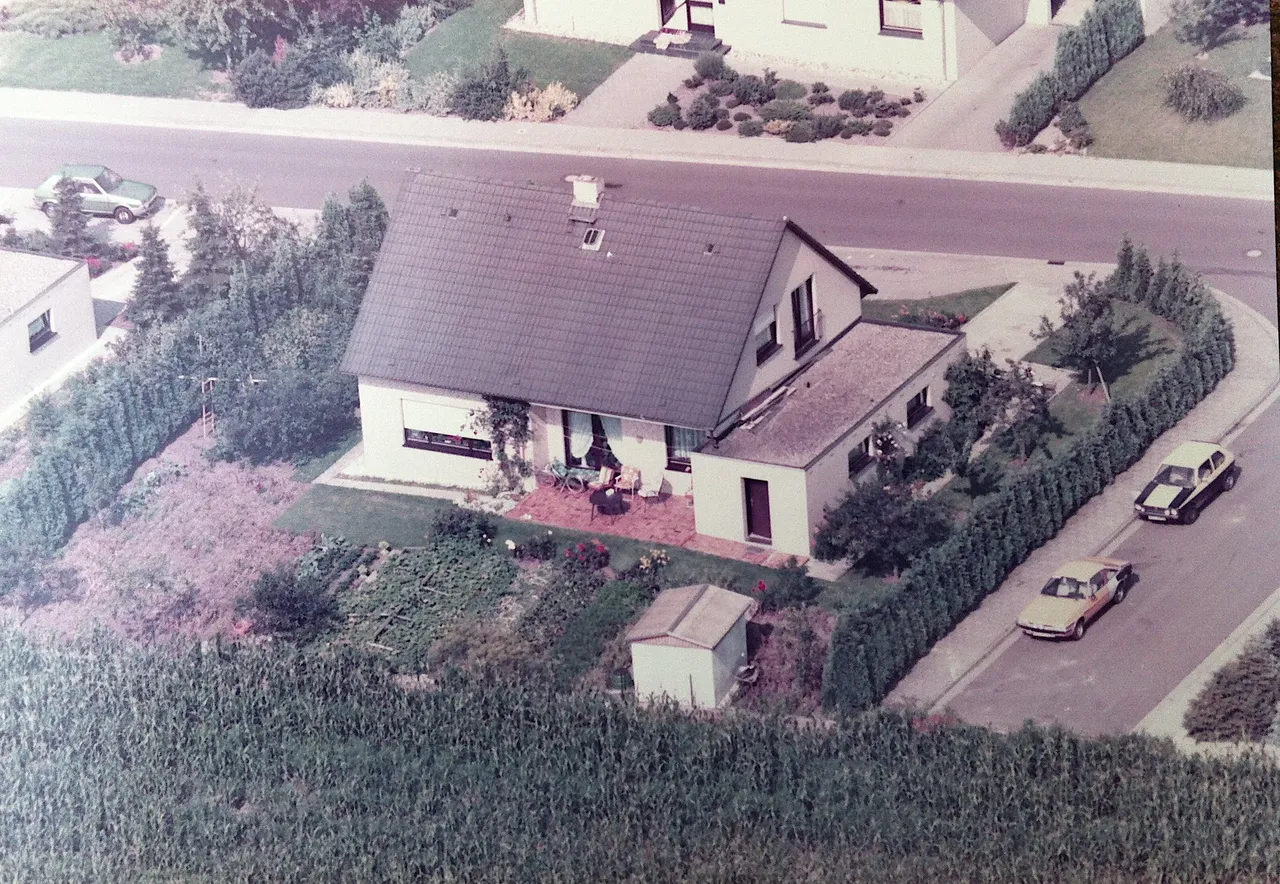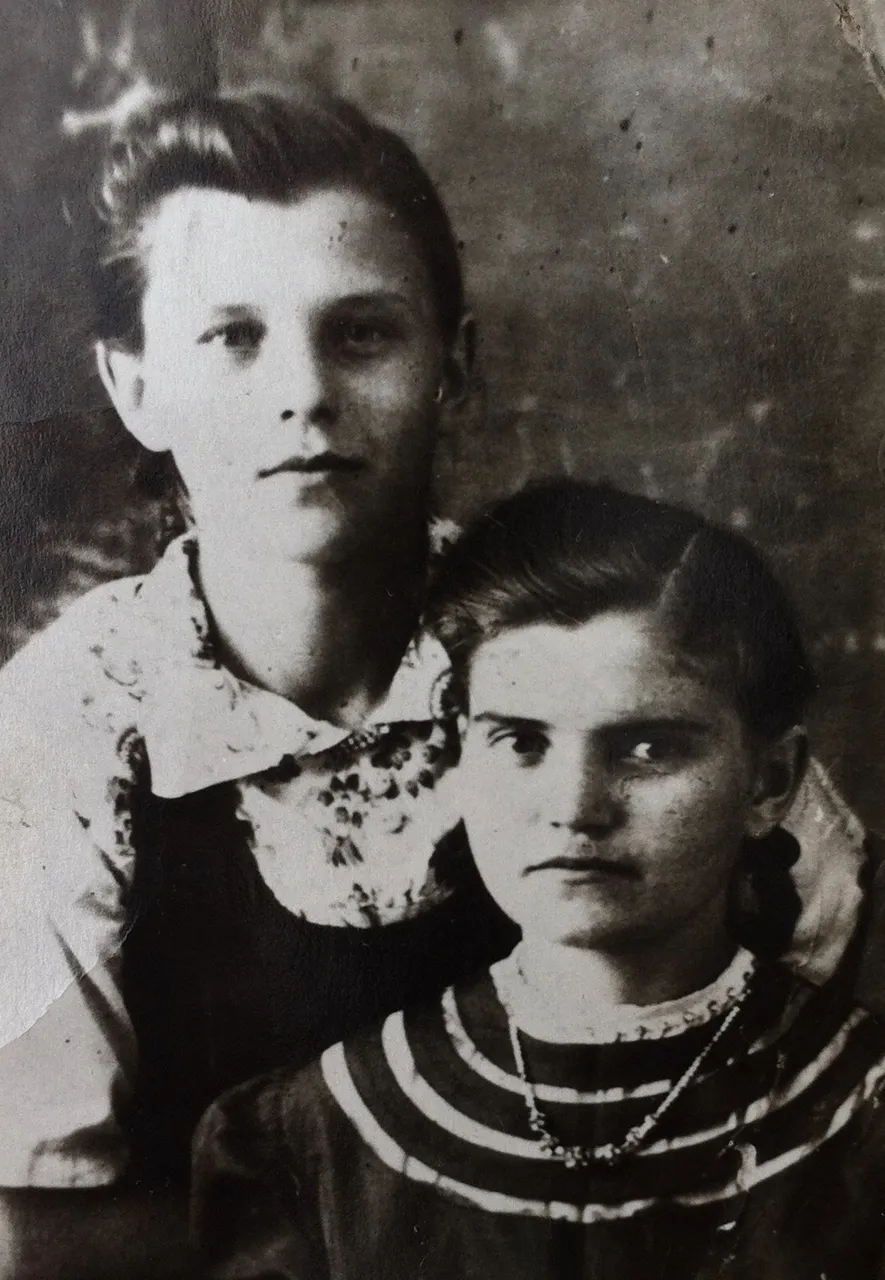
Yesterday I visited the old neighbour who lives in the house next to my brother.
On the picture above you see just a tiny bit of the neighbors garage. This picture was taken probably in the late 70s or beginning of the 80s. On the right sight you see two of my brothers cars parked at the dead end of the road. A corn field stretched there.
Since my family settled where I grew up, this neighbourhood has existed and people have grown very old in this part of the village. I went to see the old woman after the neighbour from across the road came over to us while we were standing outside the house in the sun to enquire about the health of my brother, who suffered a serious heart attack over Easter.
So together we went to the old lady and kept her company for a bit. As usual, it didn't take long and she told stories from her long and eventful life. In order not to consign them to oblivion, I would like to reproduce what she told me.
After their imprisonment in Russia, my parents settled in Kazakhstan and the neighbour next door was also one of the Germans who lived there.
She told me about a woman in the village who had been abused by her husband.
"In her panic, the woman crawled under the bed, from where the man tried to pull her out by the hair,
tearing huge tufts of hair and skin from her head, she kicked at him and managed to free herself and quickly ran over to the neighbours to find shelter. When people saw how badly the woman had been beaten, some men gathered and visited the culprit at home. They said that if he dared to lay a hand on his wife again, he would be very badly off."
"And?" I asked eagerly, "what happened then?" She said, "Well, it helped, the man kept his hands off the woman."
It made me think and after a while I said, "Today, in our modern world, the woman might call the police. They then take up the matter and caution the man. But as we know, this does not stop some people from continuing to control their fellow human beings with brute force. The police can't help much and I would actually say that it is much more effective if neighbours and friends make serious threats. We don't have that kind of cohesion anymore, it's really very sad that people don't care about each other."
I used to be really overly naive in such matters and would have thought that the police would be an effective deterrent against people who prey on weaker people.
The old woman had more stories in store.
One of them was a really interesting healing method that could be traced back to the skilled people in the village, as the neighbour said.
She also said: "We grew up so stupid, we knew little or nothing about how to help ourselves when we were sick. One child from the village had experienced such a bad scare, he probably got scared so badly that he started having seizures and foaming at the mouth from then on."
Immediately I had the diagnosis on my lips and said: "Oh, you mean epilepsy!"
She ignored me and continued: "The practitioner recommended the following treatment: Take water from nine different wells and give it to the child to drink little by little. Then be very gentle with him, have a lot of patience, he may behave strangely or unusually, but always keep calm and be kind to this child. It will need time to heal and you should not scold or otherwise be angry with it." And again my incredulous question, "And did it help?" She said, "But yes! The child was no longer plagued by his illness."
The other neighbour, a younger generation, sat there in silence and I could literally hear her thoughts, which had probably gone something like this, that the old woman was quite superstitious and that there probably couldn't be very much to this story.
I, on the other hand, was fascinated and said: "It's really a very interesting story, H., it shows how much all the villagers showed sympathy for how their fellow men were doing. I think that is a very good way to deal with a sick child and if people believe together that a method is helpful, then it may help in very many cases. How nice to hear something like that."
"Yes, it's good", she continued, "we've learned a lot, but we've also unlearned a lot since we've been living in Germany."

working place of my dad after we settled in anew
"When we came here, people treated us like fools. A forewoman in the factory where I worked for a while told me to "work faster". And when I said to her that if she wanted to work faster, she could just help herself, she said to me "stupid Russian!" and left. A short time later I received my papers and was released. She hadn't even told me and if I hadn't been so scared and cried so much, I would have resisted her with the knowledge I had today."
I said, "Yes, we are really not very thorough with how we defend ourselves. And also not with how we can treat ourselves when we feel bad. When we have a headache, we take a pill." And she: "Yes, exactly! We have forgotten how to educate ourselves and defend ourselves."
In this context, I remember that as a small child I liked to say to other children that if they beat me up, I would tell my bigger brothers about it. Unfortunately, I didn't really believe that they would come because they didn't go to the same school as me and that my threat was basically an empty one.
Once a boy actually beat me up badly and pulled my hair so hard and punched me in the stomach that I could still pull the tufts off my head days later. I didn't tell anyone anything.
Today I wish I had, but even then the teachers and adults told us not to fight. However, I misunderstood, because what was meant was that stronger children should not hit the weaker ones and it should have said that the weaker ones shall defend themselves very well and that you have to put a bully in his place, if necessary with violence in the act, which he has to feel in his own body.
It's the act which counts in the act.
The police, I think today, have never been able to protect the weaker ones if they do not count themselves among the normal people and so it has rather become the case that the policemen who stand up to the weaker ones only protect the stronger ones and not the other way round. Because they kowtow to those who pay them their salaries.
Protection can only be granted where a situation arises that concerns fellow human beings.
Where no one knows each other, where one does not care about one's neighbours, where people live anonymously next to each other, they lose all sense for their fellow human beings.
That is what you can understand under „loss of humanity“, for the people have simply forgotten that „protection“ is something naturally, that there is a hierarchy.
The violator wants to dominate the weak.
To prevent this dominance it belongs into the hands of the people themselves to provide for protection.
Police may have been such a thing for a while during its early formation, but today, police works under the state-domincance, under the violence of their authorities.

This authority is not the woman who got raped or the child who got beaten up from a brutal parent or suffered from a sadistic school teacher. The authorities are the politicians and their sub-authorities, which know nothing from the peoples lives as they neither work together, nor feast or mourn together, so not know each other.
Not knowing each other is the worst thing which can happen to people.
Those from the peoples who mock the freedom demonstrators as square heads, they have forgotten, who they are and who they were. Not only that, they have taken on a strange identity, which prevents remembrance. They took the identity of those who reign over them.
It seems to me as if since centuries, if not millenia, we, the people serve as a mere audience to the powerful. To the bullies, having fun and satisfaction doing violence to us.
The people, you and me, we shall hang on their lips, shall only deal with what those figures „bring on“ to „give us a better life“. Those, who are so stupid to accept this identity and have pulled this on as a second skin, those, who believe what comes out the mouths of the powerful, they do so, because they think the figures speak with their mouths.
Question remains,
how this is even possible to think that a man who is not your neighbor, who shares not your space of living, who is not part of your daily joys or sufferings, can have the slightest interest in them or in you?
The authority, the powerful do not read in the newspapers about you, the dominator doesn't know you, neither your name, not your story, nor your heritage.
For the authority you are a nobody, a nameless and an un-person.

We, as the viewers of a giant theatre, reigned from people, who want to reassure themselves on a daily bases that the audience keeps sitting there, keeps watching and listening to them, we probably are like addicts who cannot stop to communicate towards each other over the distance.
Over the distance of the media-barriers which mistake the play for the real.
Then, having consumed the media contents, we allegedly talk to "each other" and about "politics," but indeed, we have no clue about this politics and we know nobody from the politicians but they appear to us as if they are well known ones, even dear ones, like in our favorite series. Why? Because we constantly see their faces, hear their voices and we long to trust them, for we think we know them.
Every other year, as so-called voters, we stroll to the polls again and again to give the actors confirmation that we are still watching and listening. While our own lives pass us by as if in a dream. We don't write or continue to tell our own stories because we don't experience our own stories.
Stuck in the reality of others, we live their lives, we argue their arguments, we get excited about their annoyances and successes.
You ask what it could be, one's own story?
Well, isn't it obvious? What did your parents or grandparents tell you, what did your siblings or other relatives tell you? Where do you come from, which culture do you belong to or did you once belong to? What are your most personal experiences and why are they less significant than what the big media theatre offers you?
And so, H. continued.
At the birth of her son A., who was a twin, but to whom the other twin never saw the light of day, because the little child, as H. very vividly described, "came out of my womb in pieces", while the other stayed inside and was born. The woman who had been with H. at the birth also helped when H. had difficulties with the afterbirth. The helper said, "Stand on all fours. Here is an empty bottle. Just blow into it regularly and the afterbirth will come." And so it did.
She thinks a lot about the births of all her children (there are six). Whenever I visited her, she remembered these births.
It seems as if she is trying to come to terms with many things in her old age, it seems as if she has discovered a new form of communicative joy in her old age that she did not display before. I remember avoiding her for about thirty years. She had been a frightening figure to me as a child. Bossy, loud and very unkind to us children.
But perhaps I had always misjudged her,
because the "friendliness" of the adults who had not experienced the same thing as my family and the whole neighbourhood of the Russian Germans, the world of the intellectual Germans that later became my world, knew nothing to do with such directness, and "violence" in their eyes was something completely and utterly repugnant, regardless of whether one might want to argue that it depends on who this violence actually comes from.
These people, who wanted and want to behave in a pedagogically correct way, do not understand the life worlds of those who are different from their own. For they haven't investigated their own stories yet.
Above all, they fail to realise that physical violence can be far less bad than the terror that can be inflicted on the psyche. You cannot be beaten for years without dying from it. But you can be psychologically tortured and terrorised for weeks, months, years and even decades. If not centuries and millenia. For it shall be obvious that families hand down their traumas, successes and all other things they have experienced and felt.
I will end here with the last of H's short stories: one of survival through the transmission of important information.
Back in Kazakhstan, H. was hit by a snowstorm when she was on her way home. She had become terribly afraid of getting lost (to "verbistern" as she said with a very old german slang) and freezing to death in the blizzard.

Then she remembered a statement made by a man who once told her that if such a thing happened and she was on a road with electricity poles, she should follow the hum of the current so as not to go off the road. She did just that and eventually arrived at a dwelling where she was given shelter by a milkmaid. Later, when the storm cleared, she went home with a companion and a great hooray awaited her at home, after the entire family had already lamented and moaned that the daughter was probably lost.
I know countless such stories, which I unfortunately never wrote down, of life and survival and mutual help and support of the people among whom I grew up. My own arrogance, the learned arrogance that people who never really get through dangerous situations tend to have, has led me off my path, the path of remembrance.
People who have become so soft, callous and indifferent to their own history are not people who help each other out of trouble, who do not dare to protect their children and old people, the weak and women and men.
But most importantly, they do not realise how to protect themselves from the whispers of those who are far away from them, of those who are strangers to them, who only seem like old acquaintances because they make regular appearances on the screens of the digital world.
I often wrote about the history of my family. I long for your stories.
What do you know about your heritage?
I would highly appreciate and love to hear from them. Don't think those anecdotes don't count. They do. They count the world for you and for me. Three sentences can change a thing, believe me.
If you do not have a single story, I'd say it's time to start collecting them.
Thank you for your attention.
Picture sources: my own except ...
... an ox after a blizzard:
Von U.S. Department of Commerce, National Oceanic & Atmospheric Adminstration (NOAA) - http://www.photolib.noaa.gov/htmls/wea00950.htm, Gemeinfrei, https://commons.wikimedia.org/w/index.php?curid=408040
